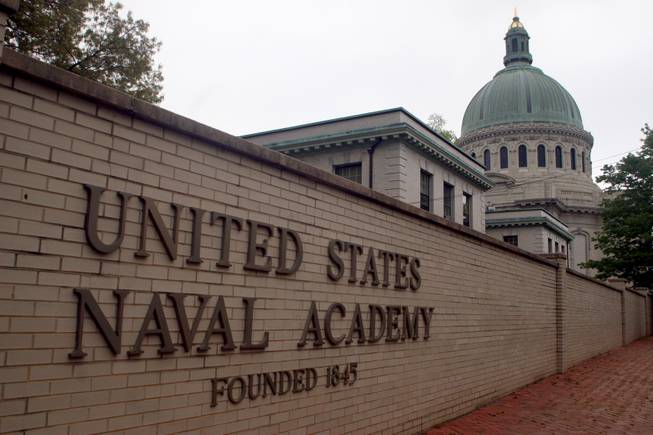
Kathleen Lange / AP
This is a May 7, 2007, file photo shows the United States Naval Academy in Annapolis, Md.
Friday, Jan. 10, 2014 | 10:47 a.m.
WASHINGTON — Students at the U.S. military academies often believe they have to put up with sexist and offensive behavior, according to a Pentagon report released Friday, reflecting a culture of disrespect that permeates the schools and their sports teams and fuels reports of sexual harassment and assaults.
The report points to scandals involving sports teams at all three academies during the last school year as examples of the problems, and it urges leaders to do more to improve training and prevention programs.
The issue of sexual assaults has gripped the military in the last year after a series of high-profile cases from academy students to generals. Led by female senators, the defense appropriations bill Obama signed in December would tighten rules surrounding how sexual-assault cases are handled in the military justice system.
The annual report on sexual assaults at the U.S. Military Academy at West Point in New York, the U.S. Naval Academy in Annapolis, Md., and the Air Force Academy in Colorado Springs, Colo., identifies sports and club teams as an area where they need to expand training.
Military officials say they are working on ways to encourage students to take action when they see or hear of sexual assault or harassment.
Overall, reported sexual assaults at the academies were down, from 80 to 70, during the school year that ended last May. Of those, almost two-thirds were at the Air Force Academy. The assaults can range from unwanted sexual contact to rape.
The report also notes that alcohol is often a factor in sexual assaults, and it urges military leaders to do more to restrict and monitor drinking and liquor sales.
Members of Congress said the report underscores the persistent problem of sexual harassment and abuse across the military.
"We must remain focused on creating an environment that prevents retaliation and revictimization," said Rep. Niki Tsongas, D-Mass.
Athletes and sports teams came under increased scrutiny in light of separate harassment and assault incidents at all three schools.
At the Naval Academy, three members of the football team faced accusations in a complicated sexual assault case involving a female student at an off-campus party. Charges were dropped against two team members. The third is still scheduled for trial.
At West Point, the men's rugby team was temporarily disbanded, and more than a dozen seniors were demoted and faced other punishment and restrictions, after emails that were derogatory to women came to light. And there was a similar problem with sports team members at the Air Force Academy circulating a document that disparaged women.
Defense officials said students view crude behavior and harassment as an almost accepted experience at the academies and that victims feel peer pressure not to report incidents. So the schools are being encouraged to beef up training, particularly among student leaders, to recognize and feel empowered to report or step in when they see unacceptable behavior.
The report, said Anu Bhagwati, head of the Service Women's Action Network and a former Marine captain, "reveals a pervasive hostile climate at our nation's military academies."
Army Maj. Gen. Jeffrey Snow, director of the Pentagon's sexual assault prevention program, said the Pentagon is telling academy leaders that they have to find ways to address the problems of retaliation and get more victims to come forward.
"If you have been a victim, please consider reaching out," Snow said at a news conference Friday. "I assure you, you will be treated with the privacy you desire, the sensitivity you deserve, and the seriousness that this crime demands."
Both the Army and Navy targeted sports team captains and are using field trips to Gettysburg, Pa., to talk to student leaders about leadership and the need to combat sexual harassment and assault within their ranks.
Lt. Gen. Robert Caslen Jr., the superintendent at West Point, said Thursday that the rugby scandal revealed a bad subculture that had existed for years.
"There were people within the organization that became desensitized to the degradation of respect," Caslen said in an AP interview. "But there were also people in the organization that recognized it as being wrong and elected not to do anything."
The challenge, he said, is finding ways to train and encourage cadets to have the moral courage to stand up and report such conduct when they see it.
At a meeting with West Point students this week, Caslen said, he talked at length about the rugby team, the punishments that were doled out and what the members learned as the team gets ready to start competing again in the spring. The punishments, he said, not only took away their ability to compete for a time, but also focused on a semester of rehabilitation.
At the end of the meeting, he said, classmates applauded team members for going through the extensive rehabilitation, which including community service work, public discussions of what they did and their remorse, and other programs.
"This is all about leadership," Caslen said. "Every one of these men and women are going to be in charge of organizations that are mixed gender, and they're going to be responsible for the command climate of their organization."
Defense officials said Friday that it difficult to tell whether the reports went down because there were fewer assaults or because victims are unwilling to come forward. But they added that during visits to the Air Force Academy, they routinely heard that the cadets there are very familiar with the sexual assault response program and may be more willing to report.

Join the Discussion:
Check this out for a full explanation of our conversion to the LiveFyre commenting system and instructions on how to sign up for an account.
Full comments policy